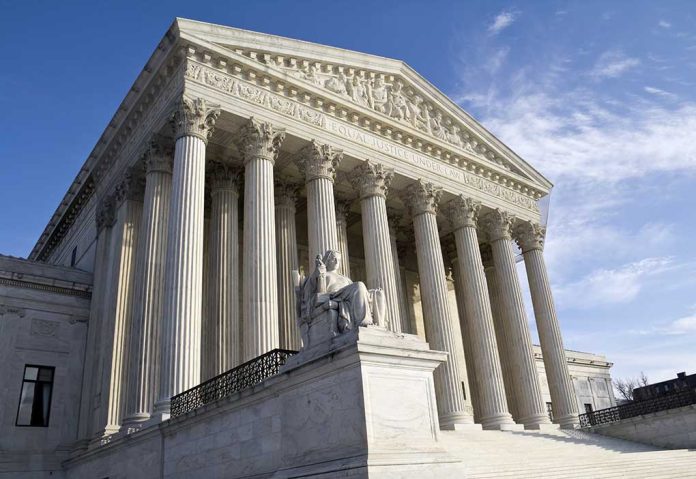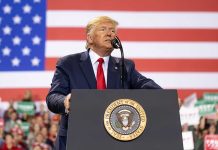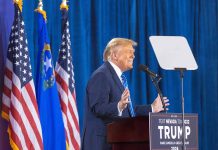
The Supreme Court’s recent rejection of John Nassif’s appeal leaves his January 6 conviction intact.
At a Glance
- The Supreme Court declined to review John Nassif’s appeal challenging his January 6 conviction.
- Nassif was convicted of four misdemeanors and sentenced to seven months in prison.
- The appeal argued that the “parading” charge violated his First Amendment rights.
- Over 1,500 people have been charged in connection with the Capitol breach.
- The decision affects over 460 defendants charged with the same misdemeanor.
Supreme Court Rejects January 6 Appeal
The U.S. Supreme Court has declined to consider a challenge to a misdemeanor charge commonly used against January 6 defendants for “parading” at the U.S. Capitol. This decision leaves intact the conviction of John Nassif, who was sentenced to seven months in prison for his role in the events of January 6, 2021.
Nassif’s appeal centered on the argument that the statute barring “parading, picketing, and demonstrating” at the Capitol violated his First Amendment rights. However, the U.S. Court of Appeals for the District of Columbia Circuit had previously ruled that Capitol buildings are not public forums for demonstrations.
“Because Nassif has not shown that the Capitol buildings are a public forum, the challenged provision need only be reasonable in light of the government’s interest in undisturbed use of the Capitol buildings for their legislative purposes,” the court said.
John Nassif of Florida was convicted of four misdemeanor counts in connection to the breach at the U.S. Capitol and received a 7-month prison term. https://t.co/khWcJWavo7
— The Epoch Times (@EpochTimes) November 13, 2024
Implications for January 6 Defendants
The Supreme Court’s decision has far-reaching implications for the hundreds of individuals charged in connection with the Capitol breach. Over 1,500 people have been charged, with nearly 600 facing accusations of assaulting or impeding law enforcement. The rejection of Nassif’s appeal affects over 460 defendants charged with the same misdemeanor.
While some defendants argue their actions were protected by the First Amendment, prosecutors maintain that the Capitol is not a public forum for demonstrations.
Political Ramifications
The ongoing legal battles surrounding January 6 continue to have political implications. Former President Donald Trump has promised to pardon some individuals convicted of January 6-related crimes if he returns to office. Trump himself faces charges related to the events of that day, to which he has pleaded not guilty.
The Supreme Court’s decision also comes in the context of other January 6-related cases. Recently, the Court rejected an appeal from former New Mexico county commissioner Couy Griffin, who was barred from office for participating in the Capitol breach. This case marked the first disqualification in over a century under the 14th Amendment’s anti-insurrection clause.
Ongoing Legal Challenges
As arrests and prosecutions continue, the legal landscape surrounding January 6 remains complex. The Supreme Court’s decision in United States v. Fischer narrowed the scope of an obstruction statute, potentially affecting some cases. However, the rejection of Nassif’s appeal suggests that challenges to the “parading” charge may face an uphill battle.
With the longest sentences being given to leaders charged with seditious conspiracy, and ongoing debates about the nature of the Capitol breach, the legal and political ramifications of January 6 continue to unfold. As the nation grapples with these issues, the balance between public safety, legislative function, and constitutional rights remains at the forefront of the discussion.
Sources
- US Supreme Court Rejects Jan. 6 Defendant’s Appeal Over Parading Charge
- Supreme Court rejects appeal over Jan. 6 ‘parading’ charge
- Supreme Court rejects appeal from New Mexico official barred from office for Jan. 6 participation

















